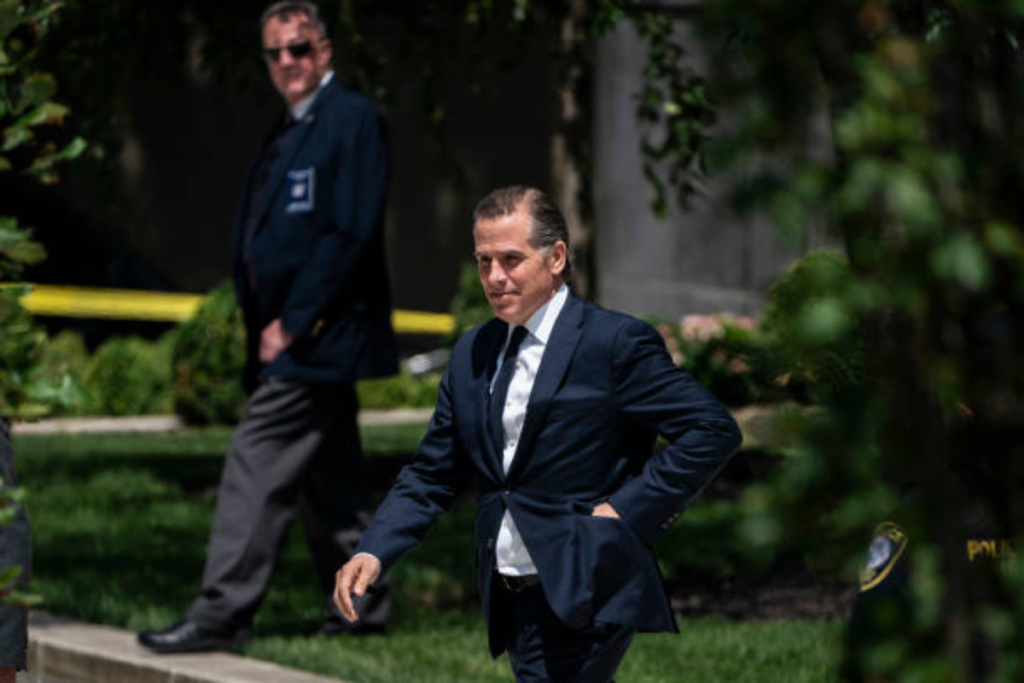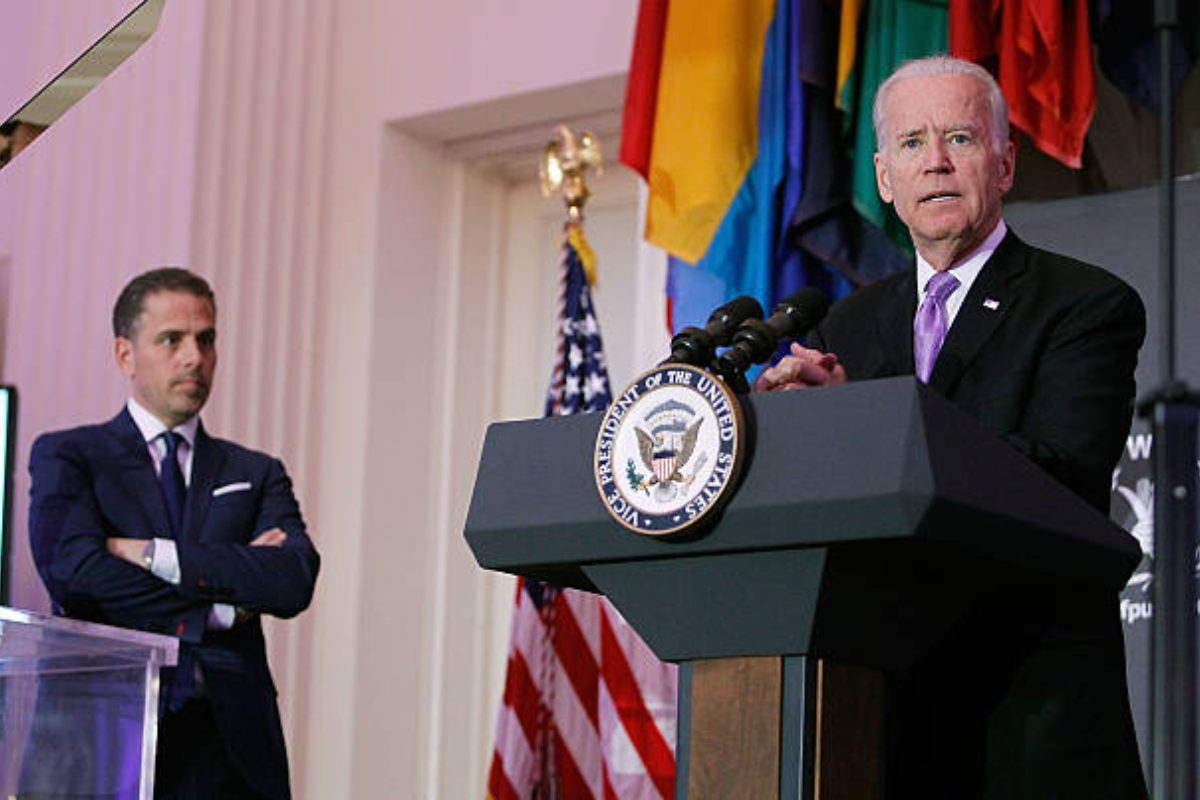“Hunter Biden’s Unexpected Turn: A Detailed Look at the House Committee Contempt Hearing”
In an unexpected twist in the ongoing political drama encircling Washington, Hunter Biden, son of U.S. President Joe Biden, made a surprise appearance at a House committee hearing. This unexpected turn of events threw the committee, and indeed the broader political community, into a state of heightened attention and speculation. Hunter Biden, a figure who has been at the center of various controversies and investigations, stepped into the limelight at a moment when the House was poised to hold him in contempt of Congress. His presence not only symbolized a bold challenge to the proceedings but also underscored the deep political divisions that characterize the current political landscape.
The context of this appearance cannot be overstated. Hunter Biden has been a focal point of scrutiny, particularly by Republican members of Congress, who have raised questions about his business dealings and alleged misconduct. These inquiries have intensified since the change in administration, with the House Republicans pursuing investigations into various aspects of his professional and personal life. This hearing was set against a backdrop of escalating tensions, with partisan lines sharply drawn. Hunter Biden’s decision to confront these issues head-on by physically attending the hearing was more than just a procedural maneuver; it was a dramatic statement in a high-stakes political showdown that has captivated the nation’s capital and the public at large.

Background
Hunter Biden, born Robert Hunter Biden in 1970, is not just the son of U.S. President Joe Biden but a figure with a multifaceted career and a history marked by both achievement and controversy. Educated at Georgetown University and Yale Law School, Hunter Biden’s professional journey has spanned law, business, and investment. He held positions at banks and served on the board of Amtrak, drawing from his educational background in law and administration. However, his career trajectory has often been overshadowed by personal challenges, including struggles with substance abuse, which he has openly discussed, and a series of business dealings that have attracted significant scrutiny and criticism.
The interplay between Hunter Biden’s activities and his father’s political career has been a point of intense discussion and controversy. Joe Biden’s ascent to the presidency brought Hunter’s business dealings, especially those overseas, into the limelight. Critics and political adversaries have frequently questioned the ethics and legality of his engagements in countries like Ukraine and China, suggesting potential conflicts of interest or undue influence due to his father’s political stature. While both Hunter and Joe Biden have denied any wrongdoing, these allegations have fueled political debates and have been a focal point for opposition groups.
Central to the controversies surrounding Hunter Biden are the ongoing investigations led by House Republicans. These investigations have delved into various aspects of his business dealings, particularly his involvement with the Ukrainian energy company Burisma Holdings, where he served on the board while his father was vice president. Republicans have raised questions about whether his position at Burisma posed a conflict of interest and have scrutinized his earnings from this role. Additionally, they have investigated his tax affairs and other business ventures, suggesting that these might have been influenced by his father’s political positions.
These ongoing investigations have contributed to a highly charged political environment, with Hunter Biden’s activities being used as a lens through which larger political battles are fought. His recent appearance at the House committee hearing is the latest chapter in this ongoing saga, reflecting the deeply intertwined nature of personal controversies and broader political struggles in contemporary American politics.

The Day of the Hearing
The atmosphere at the House committee hearing was charged with anticipation, but nothing prepared the room for the dramatic entrance of Hunter Biden. On a day marked for contemplation of his alleged misconduct, Hunter’s surprise appearance was a bold and unprecedented move. The moment he stepped into the room, a palpable shift occurred; whispers rippled through the audience, and the attention of every attendee was immediately drawn to him. The air was thick with a mixture of surprise, confusion, and heightened curiosity.
Hunter Biden, accompanied by his legal team, walked in with a composed demeanor, his face an inscrutable mask. He did not take a seat at the witness table but instead stood quietly at the back of the room. Despite the gravity of the situation, he remained mostly silent, his presence alone speaks volumes. His lawyers, notably Abbe Lowell, were at his side, ready to navigate the legal intricacies of the hearing. Hunter’s actions seemed calculated to make a statement rather than to participate in the day’s proceedings.
The reactions from committee members were immediate and starkly divided along partisan lines. Republican members, who had been pushing for this hearing and the subsequent vote on contempt, appeared taken aback yet quickly regained composure to proceed with their agenda. Some, like Georgia GOP Rep Marjorie Taylor Greene, openly expressed frustration and disdain, calling Hunter a “coward” as he exited the room. Their tone was one of stern accusation, seeing his appearance as a defiance of the process.
Conversely, Democratic members of the committee reacted differently. They seemed less surprised and more strategic in their responses, emphasizing the unusual nature of a private citizen being called to such a hearing and pointing to Hunter’s willingness to testify publicly as a sign of transparency. Their comments suggested a narrative of political victimization and a critique of the Republicans’ handling of the investigation.
Hunter Biden’s sudden appearance and the subsequent reactions encapsulated the deep partisan divide that characterizes the current political climate in Washington. His silent yet powerful presence turned the hearing into a symbol of the ongoing battle between the Biden administration and its opponents, with each side interpreting his actions through their political lens.
Legal Stance of Hunter Biden
Hunter Biden’s legal stance, articulated by his attorneys, has been one of steadfast denial of wrongdoing and a call for transparency. His lead attorney, Abbe Lowell, has positioned Hunter’s actions not as defiance but as a commitment to openness, stressing his willingness to testify publicly. This approach is rooted in a legal strategy that seeks to mitigate the risks of misrepresentation and selective leaking of information, a concern frequently voiced by the defense. Hunter’s legal team has repeatedly emphasized the political nature of the investigations, framing them as a partisan pursuit rather than a legitimate inquiry into unlawful conduct. This narrative is central to their defense, painting Hunter as a target of political vendetta rather than a subject of impartial legal scrutiny.

From a political perspective, the Republicans’ pursuit appears to be twofold: to hold Hunter accountable for alleged misconduct and to leverage his controversies as a means to undermine the Biden administration. Their strategy is indicative of a broader tactic to cast doubt on the integrity of the President by focusing on the activities of his son. By insisting on private depositions, Republicans aim to control the narrative and possibly unearth damaging information that could have broader political ramifications.
Conversely, the Democrats’ defense of Hunter is framed around protecting the integrity of legal processes and guarding against what they perceive as political exploitation. By advocating for public testimony, they aim to counteract potential partisan narratives and maintain a semblance of transparency in the proceedings. This approach also serves to shield the Biden administration from collateral damage arising from Hunter’s legal battles.
The impact of these events on President Biden’s administration and public perception is complex. On one hand, the ongoing investigations keep the spotlight on Hunter’s controversies, potentially casting a shadow over the President’s tenure and distracting from his policy agenda. On the other hand, the perception of the investigations as overly partisan could backfire on Republicans, potentially galvanizing Biden’s support base and portraying him as a victim of political witch-hunting. The unfolding of these events could significantly influence public opinion, shaping the narrative around the Biden administration and its handling of internal and external challenges.
Public and Media Reaction
The media coverage of Hunter Biden’s surprise appearance at the House committee hearing varied significantly across different outlets, reflecting the polarized nature of American media. Conservative outlets tended to portray the event as a defiant and controversial act by Hunter Biden, emphasizing the alleged misconduct under investigation. These reports focused on the potential legal ramifications and the perceived audacity of his unannounced presence. In contrast, liberal media outlets presented Hunter’s appearance in a more sympathetic light, highlighting his willingness to testify publicly and framing the Republican-led investigation as politically motivated. This dichotomy in media coverage underscores the deep partisan divisions in the U.S., with news outlets often tailoring their narratives to align with the political leanings of their audiences.
Public opinion on social media and opinion pieces mirrored this divide. On platforms like Twitter and Facebook, responses ranged from support for Hunter Biden’s right to a fair and open hearing to accusations of evasion and misconduct. Opinion pieces and editorials in major publications reflected these sentiments, with some commentators criticizing the politicization of congressional hearings, while others called for rigorous scrutiny of Hunter’s activities.

Legal experts provided varied perspectives on the potential outcomes and precedents set by this case. Some pointed out the rarity of a private citizen, especially one closely related to the President, being held in contempt of Congress, discussing the legal nuances of such an action. Others focused on the implications for congressional investigative powers and the balance of political accountability versus individual rights.
Political analysts offered broader insights into the implications for U.S. politics. Many viewed the event as indicative of the heightened partisanship in Washington, arguing that it could further entrench divisions and distract from legislative priorities. Some analysts suggested that the handling of Hunter Biden’s case could set a precedent for future political battles, shaping how congressional investigations are perceived and conducted in an increasingly polarized political environment.
Conclusion
In summary, Hunter Biden’s unanticipated appearance at the House committee hearing marked a significant moment in the ongoing saga surrounding his business dealings and alleged misconduct. It highlighted the deep political divide in Washington, with contrasting interpretations from Republicans and Democrats. Media coverage and public opinion reflected this polarization, with varying narratives and reactions across the political spectrum. Legal and political experts provided insights into the potential ramifications of this event, underscoring its complexity and the broader implications for American politics.
Looking ahead, this episode is likely to fuel further political discourse and potentially influence upcoming legislative actions and investigations. The manner in which this case unfolds could set precedents for future political and legal proceedings, shaping the dynamics of congressional power and oversight.
This incident prompts reflection on the role of political investigations in American democracy. It raises questions about the balance between holding public figures accountable and the potential for such inquiries to be used as tools in partisan warfare. As the situation evolves, it will be crucial to consider how these processes serve the broader interests of justice and democratic governance in the United States.







